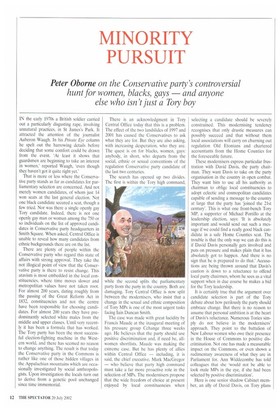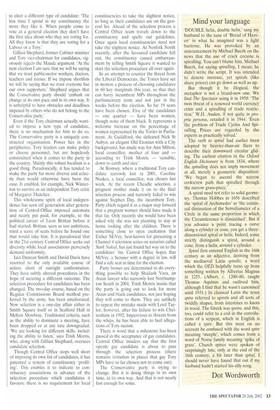MINORITY PURSUIT
Peter Oborne on the Conservative party's controversial
hunt for women, blacks, gays — and anyone else who isn't just a Tory boy
IN the early 1970s a British soldier carried out a particularly disgusting rape. involving unnatural practices, in St James's Park. It attracted the attention of the journalist Auberon Waugh. In his Private Eye column he spelt out the harrowing details before deciding that some comfort could be drawn from the event. 'At least it shows that guardsmen are beginning to take an interest in women,' reported Waugh, 'even though they haven't got it quite right yet.'
That is more or less where the Conservative party stands as far as candidates for parliamentary selection are concerned. And not merely women candidates, of whom just 14 won seats at the last general election. Not one black candidate secured a seat, though a few tried. Nor was there a single openly gay Tory candidate. Indeed, there is not one openly gay man or woman among the 750 or so individuals on the list of approved candidates in Conservative party headquarters in Smith Square. When asked, Central Office is unable to reveal how many candidates from ethnic backgrounds there are on the list.
There are plenty of people within the Conservative party who regard this state of affairs with strong approval. They take the not illogical point of view that the Conservative party is there to resist change. This atavism is most embedded in the local constituencies, where time moves slower and metropolitan values have not taken root. For almost 200 years, dating roughly from the passing of the Great Reform Act in 1832, constituencies and not the centre have been responsible for choosing candidates. For almost 200 years they have predominantly selected white males from the middle and upper classes. Until very recently it has been a formula that has worked. The Tory party has been the most successful election-fighting machine in the Western world, and there has seemed no reason to change anything. The result is that today the Conservative party in the Commons is rather like one of those hidden villages in the Appalachian mountains which are occasionally investigated by social anthropologists. Upon investigation the locals turn out to derive from a genetic pool unchanged since time immemorial. There is an acknowledgment in Tory Central Office today that this is a problem. The effect of the two landslides of 1997 and 2001 has caused the Conservatives to ask what they are for. But they are also asking, with increasing desperation, who they are. The quest is on for blacks, women, gays: anybody, in short, who departs from the social, ethnic or sexual conventions of the regulation Conservative party candidate of the last two centuries.
The search has opened up two divides. The first is within the Tory high command, while the second splits the parliamentary party from the party in the country. Both are damaging. Tory Central Office is now split between the modernisers, who insist that a change in the sexual and ethnic composition of Tory MPs is one of the most urgent tasks facing lain Duncan Smith.
The case was made with great lucidity by Francis Maude at the inaugural meeting of his pressure group Cchange three weeks ago. He believes that the party should use positive discrimination and, if need be, allwomen shortlists. Maude was making the extreme case. But he has plenty of allies within Central Office — including, it is said, the chief executive, Mark MacGregor — who believe that party high command must take a far more proactive role in the selection of MPs. The modernisers propose that the wide freedom of choice at present enjoyed by local constituencies when selecting a candidate should be severely constrained. This modernising tendency recognises that only drastic measures can possibly succeed and that without them local associations will carry on churning out regulation Old Etonians and chartered accountants from the Home Counties for the foreseeable future.
These modernisers express particular frustration with David Davis, the party chairman. They want Davis to take on the party organisation in the country in open combat. They want him to use all his authority as chairman to oblige local constituencies to adopt eclectic and cosmopolitan candidates capable of sending a message to the country at large that the party has 'joined the 21st century'. This is what one front-bench Tory MP, a supporter of Michael Portillo at the leadership election, says: 'It is absolutely important and would send out such a message if we could find a really good black candidate in a safe Home Counties seat. The trouble is that the only way we can do this is if David Davis personally gets involved and puts on pressure and makes plain that it has absolutely got to happen. And there is no sign that he is prepared to do that.' Accusations are being thrown around that Davis's caution is down to a reluctance to offend local party chairmen, whom he sees as a vital support when in due course he makes a bid for the Tory leadership.
It is certainly true that the argument over candidate selection is part of the Tory debate about how perilously the party should embrace change. But there is no reason to assume that personal ambition is at the heart of Davis's reluctance. Numerous Tories simply do not believe in the modernisers' approach. They point to the battalion of New Labour women who owe their presence in the House of Commons to positive discrimination. Not one has made a measurable impact on the Commons, or even shown a rudimentary awareness of what they are in Parliament for. Ann Widdecombe has told colleagues that she 'would not be able to look male MPs in the eye, if she had been selected by positive discrimination'.
Here is one senior shadow Cabinet member, an ally of David Davis, on Tory plans to elect a different type of candidate: 'The less time I spend in my constituency the more they like it. When people come to vote at a general election they don't have the first idea about who they are voting for, All they know is that they are voting for a Labour or a Tory.'
Gillian Shephard, former Cabinet minister and Tory vice-chairman for candidates, vigorously rejects the Maude argument. 'At the next election I am sure that we will be saying that we trust public-sector workers, doctors, teachers and nurses. If we impose shortlists we will be saying that we trust everyone but our own supporters.' Shephard argues that the Conservative party should 'embark on change at its own pace and in its own way. It is unhelpful to have obstacles and deadlines imposed by others who do not belong to the Conservative party.'
Even if the Tory chairman actually wanted to impose a new type of candidate, there is no mechanism for him to do so. The Conservative party is a uniquely constructed organisation. Power lies in the peripheries. Tory leaders can make policy or choose personnel, but are hopelessly constrained when it comes to the party in the country. Mainly this robust localism is a good thing. Paradoxically, it has tended to make the party far more diverse and eclectic than would otherwise have been the case. It enabled, for example, Nick Winterton to survive as an independent Tory critic of Margaret Thatcher.
This wholesome spirit of local independence has seen off generation after generation of Central-Office imposed automata and nearly put paid, for example, to the political career of Leon Brittan before it had started. Brittan, seen as too ambitious, tried a score of seats before he found one that would take him. It is paradoxical that in the 21st century Central Office seeks out diversity while local associations perversely demand uniformity.
lain Duncan Smith and David Davis have resorted to the only available course of action, short of outright confrontation. They have subtly altered procedures in the hope of securing a different outcome. The selection procedure for candidates has been changed. The two-day course, based on the Regular Commissions Board method preferred by the army, has been ameliorated. Now selection is a one-day affair either in Smith Square itself or in Scalford Hall in Melton Mowbray. Traditional criteria, such as the ability to dominate a meeting, have been dropped or at any rate downgraded. 'We are looking for different skills, including the ability to listen,' says Trish Morris, who, along with Gillian Shephard, oversees candidate selection.
Though Central Office stops well short of imposing its own list of candidates, it has patented a system of constituency 'profiling'. This enables it to indicate to constituency associations in advance of the selection procedure which candidates it favours: there is no requirement for local
constituencies to take the slightest notice, so long as their candidates are on the general list. Ahead of the selection process a Central Office team travels down to the constituency and spells out guidelines. Once again local constituencies need not take the slightest notice. At Norfolk North recently, after the favoured candidate fell out, the constituency caused embarrassment by telling Smith Square it wanted to start the selection procedure all over again.
In an attempt to counter the threat from the Liberal Democrats. the Tories have set in motion a process of choosing candidates in 60 key marginals this year, so that they can harry incumbent MPs throughout the parliamentary term and not just in the weeks before the election. So far 19 seats have been chosen. Five of the candidates — one quarter — have been women, though none of them black. It represents a welcome increase on the percentage of women represented by the Tories in Parliament. At Guildford, the defeated Nick St Aubyn, an elegant Old Etonian with a City background, has made way for Ann Milton, local councillor, mother of four and — according to Trish Morris — 'sensible, down to earth and nice'.
At Romsey, where a traditional Tory candidate narrowly lost in 2001, Caroline Noakes, a local councillor, was chosen last week. At the recent Cheadle selection, a pregnant mother made it on to the final selection process and narrowly failed to win against Stephen Day, the incumbent Tory. Party chiefs regard it as a major step forward that a pregnant women should have made it that far. Only recently she would have been asked why she was not planning to stay at home looking after the children. There is something close to open exultation that Esther McVey, best-known for presenting a Channel 4 television series on naturists called Stark Naked, has just found her way on to the candidates' list, Central Office hopes that McVey, a Scouser with a degree in law, will find a safe seat in time for the election.
Party bosses are determined to do everything possible to help Shailash Vara, an Asian lawyer who narrowly lost Northampton South in 2001. Trish Morris insists that the party is going out to look for more Asian and black candidates, not just hoping they will come to them. They are unlikely to repeat the mistake made with Lord Taylor, however, after his failure to win Cheltenham in 1992. Impervious to threats from the whips, he has been able to hurl allegations of Tory racism.
There is word that a milestone has been passed in the acceptance of gay candidates. Central Office insiders say that the first openly gay candidate is about to pass through the selection process (there remains irritation in places that gay Tory MPs have so far chosen not to come out).
The Conservative party is trying to change. But it is doing things in its own time, in its own way. And that is not nearly fast enough for some.



























































 Previous page
Previous page